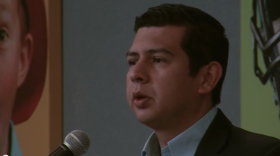Just months ago, San Diego Democratic mayoral candidate David Alvarez was little known outside his City Council district. Now, the city is familiar with his story of growing up poor in Barrio Logan, the youngest child of a fast-food worker and a janitor.
But looking beyond the personal, what are the political issues defining the race between Alvarez and his opponent, Republican Kevin Faulconer?
If you just arrived in San Diego and you take a quick glance at the slogans of the two candidates vying to be mayor, you'd see that their political ads are very similar — both candidates claim that they will be a mayor for everyone.
Mesa College political scientist Carl Luna says the words they are using are about as empty an unfilled pothole.
"That's one of the absences of leadership in this whole campaign: when people say I want to be mayor for all San Diego, they have to explain what they mean by that and not use it for some sort of political code-word, which I am afraid both of the campaigns are doing," Luna said.
They might be using the same language, Luna said, but just who is doing the speaking colors the meaning.
"There's an argument to be made that when they say a mayor for all San Diego, for Kevin Faulconer it means I'll be a mayor for white San Diego too, not just Latino San Diego. And for David Alvarez, it means it's no longer gonna be just those white guys," Luna said.
Luna says to really govern all San Diego, both candidates much reach beyond their base.
"There's a lot more than just filling up potholes involved in the way people cast their votes," Luna said. "And there is a growing sense of perception of unfairness in American society."
Luna says that there is a growing awareness of a deepening divide between the haves and the have-nots. And that feeling of unfairness — of the system not working for everyone — is why Alvarez says he is running for mayor.
"I believe very strongly in having an economy that works for everyone — primarily the middle class — and that's how I'm going to govern," Alvarez said. "And it is probably going to be in disagreement sometimes with some big corporate interests, and that's okay."
On issues like developer fees for affordable housing and a new community plan in Barrio Logan, Alvarez has certainly butted heads with business. He also supports some progressive platforms, like a living wage for workers. And he says the myopic focus on downtown development has got to end.
He wants San Diego to become "...a first class city like other cities where we get people moving through transit instead of cars, and we activate public spaces."
Alvarez says that's the future of San Diego.
Whether Alvarez will face that future as mayor will be decided at the polls. But it will be an uphill battle. While there are more registered Democrats in San Diego, a special election favors an older, whiter and Republican turnout.
And Faulconer is turning on the heat: attacking Alvarez for being in the pocket of unions. Alvarez' campaign is getting lots of cash from organized labor. But he says that doesn't make him their lackey.
"I think it just means that your values are in line with what their values are," Alvarez said. "In the case of the labor council, it's the values of working people, that's exactly who I am. My mom being a fast food worker, my dad a janitor...you can't get more blue colored than that."
But how will the personal translate into policy? Political scientist Luna says knowing that is hampered by a short election cycle that is heavy on negativity and light on substance.
"I think what you are gonna have to wait for unfortunately, is how they actually govern — who ever wins. Because right now they are just in campaign mode," Luna said.
A mode not likely to let up until voting day on Feb. 11.








